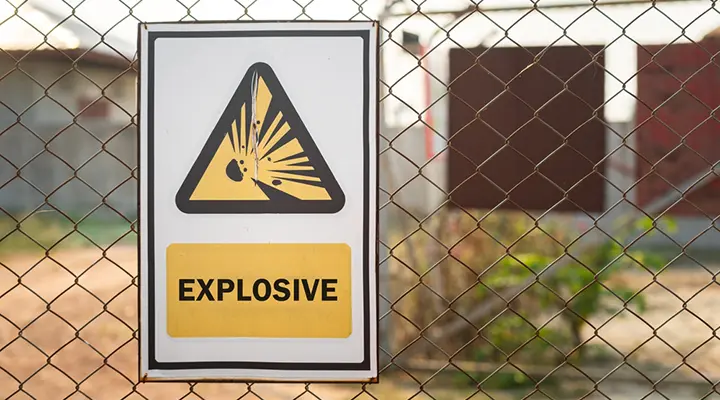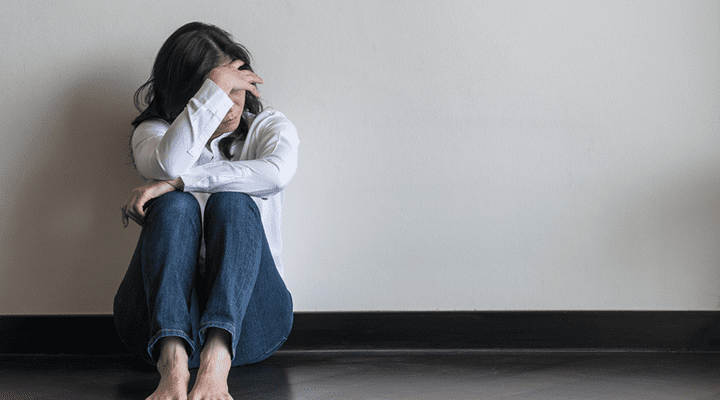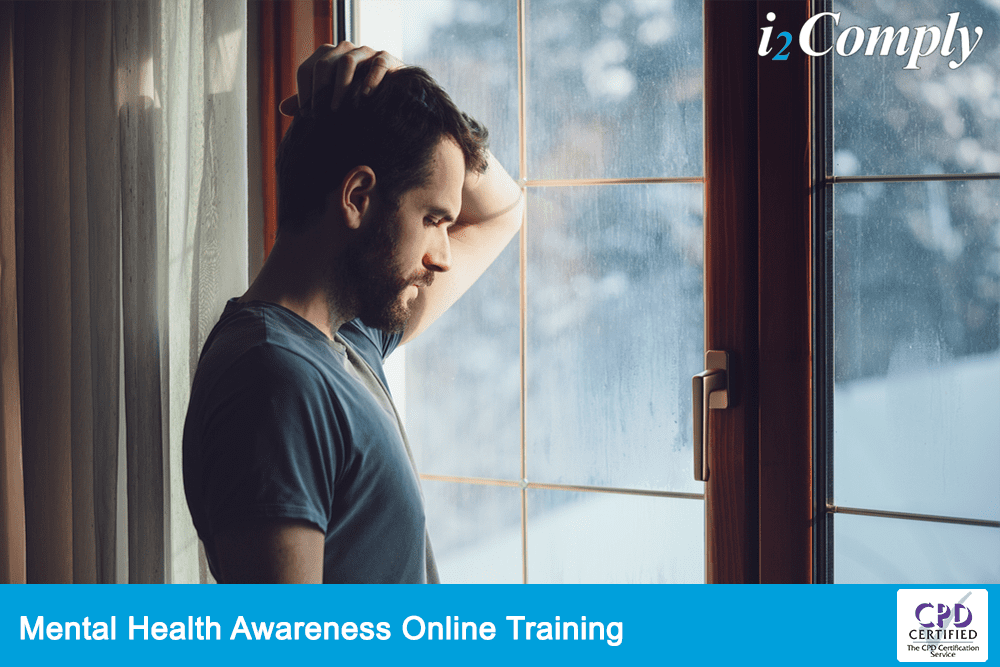Mental Health Awareness Week is an annual event that aims to raise awareness about mental health issues and promote mental well-being. It provides an opportunity for individuals, organisations and communities to come together and discuss mental health issues openly and reduce the stigma surrounding mental health.
This year’s Mental Health Awareness Week takes place from 15th to 21st May and the official theme for this year, as set by the Mental Health Foundation, is ‘anxiety’. The aim of this year’s theme is to increase people’s awareness and understanding of anxiety and anxiety disorders, and provide information about measures that help to cope with anxiety.
As part of our Mental Health Awareness Course, we can help anyone understand anxiety and how to get support. In today’s blog post, we thought it would be a great idea to focus in on anxiety so you can understand what it is, why it happens, and how to get help.
What is anxiety?
Anxiety is a common emotion that we all experience at some point in our lives. It is normal to feel anxious or worried in certain situations. Many things can cause a feeling of anxiety, such as a build-up of stress at work, exam pressures, unemployment, financial worries, arguments, uncertainty, discrimination or big life events.
Anxiety can affect us mentally and physically. If you are feeling anxious, you might notice increased heart rate, sweating, shaking, headaches, loss of appetite, breathlessness or chest pain. You may also feel nervous, tearful, irritable, and find it hard to relax or concentrate.
What is anxiety disorder?
Sometimes anxiety can get out of control and become a mental health problem. When anxiety becomes excessive, persistent and interferes with our daily lives, it can lead to anxiety disorders. According to Mental Health UK, anxiety disorders affect over 8 million people in the UK – that is a little over 1 in 10 of us.
There are several types of anxiety disorders, including generalised anxiety disorder, panic disorder, social anxiety disorder, and specific phobias. Generalised anxiety disorder is characterised by excessive worry and fear about daily events and activities, while panic disorder involves sudden and intense panic attacks. People with social anxiety disorder are afraid of social situations and interactions. Phobias involve an intense fear of a particular object or situation.
Treatment for anxiety disorders typically involves a combination of medication and therapy. Medications such as antidepressants and anti-anxiety drugs can help to reduce the symptoms of anxiety, while therapy can help individuals to identify and address the underlying causes of their anxiety.
How to cope with anxiety?

With proper treatment and support, individuals with anxiety disorders can learn to manage their symptoms and improve their quality of life. However, there are plenty of ways to cope with anxiety before it becomes a serious mental health problem.
Look after your physical health
Exercising regularly, eating balanced meals, getting enough sleep, avoiding alcohol and quitting smoking are great ways to relieve your anxiety. Exercising requires some concentration on your body, which can take your mind off your fear and worries, reduce symptoms of anxiety and improve overall mental health. Eating regularly and keeping your blood sugar stable can improve your mood and energy levels. Getting enough sleep allows you to have the energy to cope with difficult experiences and feelings. Consuming alcohol and smoking can worsen anxiety.
Use stress management and relaxation techniques
Relaxation techniques such as deep breathing, visualisation and progressive muscle relaxation can help reduce anxiety and promote a sense of calm. You can practice these techniques at any time, and they can be particularly helpful during times of stress or anxiety. You could also try doing yoga, meditation or massage.
Talk to someone you trust
Social support is also an essential factor in coping with anxiety. Talking to friends or family can provide a sense of comfort and support during times of stress or anxiety. It may be that just having someone listen to you and show that they care can be helpful. Even if you are finding it difficult to open up about the things that make you anxious, socialising with your friends and family can help relieve stress, encourage laughter and feelings of togetherness, and reduce loneliness. This can make you feel at ease during stressful times and allow you to better cope with anxiety.
If you aren’t able to open up to someone close to you, joining a support group or participating in group therapy can also provide a sense of community and understanding. You can learn about managing anxiety in local support groups from people with similar experiences, who may share their stories and tips.
Also, you can contact the Samaritans and Anxiety UK, who run helplines you can call if you need someone to talk to.
Write down your thoughts
People with anxiety often experience racing thoughts. These are rapid, fast-moving, repetitive thought patterns that can be overwhelming. When you have racing thoughts, you may feel like you cannot stop or slow down your thoughts, you have no control over your thoughts, it is difficult to focus on anything else, you start catastrophising or thinking about worst-case scenarios and you are stuck in a thinking loop.
People who struggle with racing thoughts constantly worry about what hasn’t been done and what needs to be done. Or they continuously think and analyse past, present, or future situations. For example, you replay a conversation with different versions of dialogue, keep thinking over an embarrassing situation, ruminate about an upcoming meeting with your boss or medical appointment, or worry about an unlikely scenario.
Writing down your anxious thoughts allows you to slow down, gets it out of your head and can make it less daunting. Since you can only write one thing at a time, it forces you to slow down, organise your thoughts, and focus on them one at a time. Writing can give you greater clarity on your concerns and help you recognise triggers that cause your anxiety. It also allows you to challenge your thoughts, prioritise, understand problems and concerns, and plan ways to resolve them.
Face your fear if you can
Some situations in life may seem so overwhelming that we may feel trapped and unable to take action and face them. Instead, we try to avoid it altogether. However, anxiety only tends to increase if you avoid things that make you feel worried.
Ask yourself if your worry is something you can solve or control. For example, if you are worried about paying your energy bills, you could contact your utility provider to learn about flexible payment options. Or, if you are worried about not being able to finish an important project before a deadline at work, speak to your employer to help you prioritise and delegate tasks to others.
If the worrying situation is something that you can control, start brainstorming and think of some possible solutions to your problem. Think about the things you have the power to control, rather than circumstances that are beyond your control. Then, make a plan and take the action to solve the problem. You will feel much less anxious.
Educate yourself about mental health issues
One of the best ways you can help yourself or someone in your life with a mental health concern is to learn more about it. Educate yourself about the signs and symptoms, the myths, the causes, where to get help for mental illness and what to do in a mental health emergency. By learning more, you will gain an understanding of yourself and feel confident to support others.
There are many resources you can use to learn about mental illness:
Research online – read blogs, journals, and websites of associations dedicated to various mental illnesses or watch informative videos.
Read books – visit your local library, bookstore, search for e-books or audiobooks for information on some specific disorders or mental health issues.
Listen to podcasts – podcasts can be a useful source of information on various topics such as wellness, self-care, mental illness, and coping strategies.
Join webinars – webinars allow you to learn about some commonly-faced challenges and techniques to overcome them and provide an opportunity to ask questions.
Sign up for an online course – online training is a great way to learn about mental health conditions, strategies to cope with them and give you confidence to support those struggling with mental health issues. Online courses provide the flexibility to learn at your own pace, and interactive course content will keep you engaged, improving understanding, and ensuring long-term knowledge retention.
Looking for an online mental health course?
Here at i2Comply, we offer the following CPD-certified online courses for only £15 per person:
1 – Online Mental Health Awareness Training
Our mental health awareness course introduces you to important concepts of mental health. You will learn how poor mental health impacts people’s lives; and what you and employers can do to support colleagues with mental health problems.
2 – Online Stress in the Workplace Training
Our Stress in the Workplace course makes you aware of the potential impact of work-related stress, allows you to recognise your stress triggers and helps you manage any work-related stress you are experiencing.




